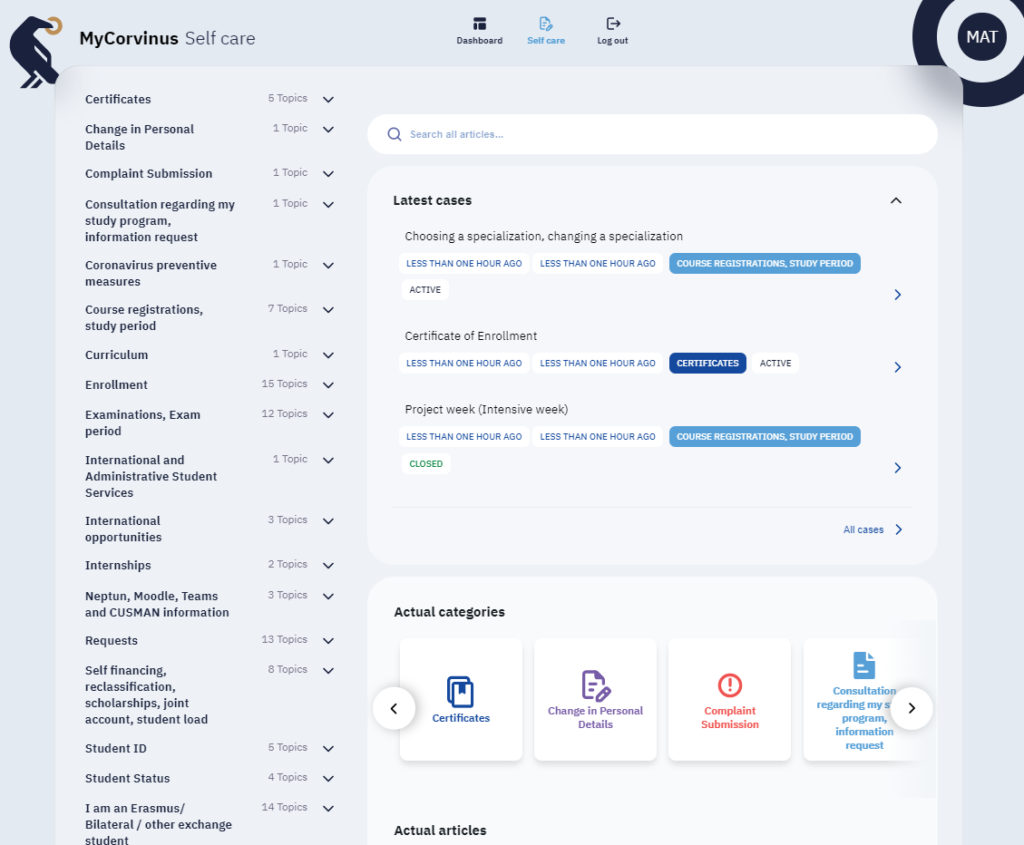Students will soon be able to give real-time feedback on classes at Corvinus via an app
What will the Navigator career orientation programme look like and what does the proctored exam offer mean? We talked to Dr. Eva Bodnár about the most important digitisation changes affecting students and experiential education.

Written by: Tünde Taxner, cover photo: Corvinus University of Budapest
The original article is available at the Közgazdász Online student blog.
“While revising courses, we focus not only on what students know at the end, but also on the competences, skills and attitudes they need to have in order to succeed in the given field of expertise,” – says Dr Éva Bodnár, a psychologist who heads the Centre for Educational Quality Enhancement and Methodology at Corvinus.
This institution is responsible not only for the revision of study programmes, but also for the training of lecturers and for all digitisation processes related to education and quality improvement. They support the university’s lecturers from a methodological, psychological and pedagogical point of view, and they also cover Moodle, Teams and the student feedback systems (HalVel and MyVoice).
Our article covers the next changes in education methodology and digitisation:
- Experiential learning and revision of study programmes
- MyVoice: the new student feedback system
- Navigator: new career and career orientation system
- proctored exam offer
Experiential learning and renewal of study programmes
Traditional university education is curriculum or instructor-focused: the lecturer stands up, explains the material, and then holds you to account during the exam period. “The focus is less on how the material delivered becomes knowledge in the student’s mind, or how their skills develop,” says Dr. Éva Bodnár.
But in the labour market, the skills and attitudes of the graduating student also matter. That is why the renewal of Corvinus’ training is being built around the output training objectives. “From this output matrix of competences, we explain what should be done during the training,” says the expert.
These competences can largely be developed through modern teaching methods. The methods are chosen by the lecturer according to the skills that are intended to be developed. This is where experiential education comes in. These methods are usually based on the student already having a basic knowledge of the subject, and learning to apply that knowledge in the classroom through interactive activities, including group work.

“Class work is really activity-based, which is why learning will be experiential,” says Dr Éva Bodnár.
A good example is the mirrored classroom – originally a Harvard method, which has been developed at Corvinus for years and is often used in the renewed degree programmes (e.g. Business and Management, Applied Economics). Using a pre-made video or online learning material, the student learns the new material and then has to pass an assessment before going to the seminar. “There, you’re really applying the knowledge by learning by doing,” explains the expert.
The aim of experiential learning is to“build up a coherent whole in the mind of the student, to see the practical use of what has been learned, how they can build on it and how the areas of expertise build on each other”. And higher education is expected to develop specific competences to ensure interoperability between universities and courses, and that the same diploma is worth the same.
Equality between student groups will also be ensured by the university through subject scenarios. In other words, tutors teaching a subject at the same time must follow the same syllabus. However, lecturers remain free to choose the method and the way in which knowledge is transferred.
MyVoice: the new student feedback system
Filling in the Student feedback system (HalVel) at the end of the semester is a long process, this questionnaire reflects on the whole semester. Students can give feedback for each subject, and those who complete all the questionnaires can register for exams and take new subjects. Complementing HalVel, MyVoice will ensure that students can give feedback in real time during the last minutes of the lesson.
“It gives a real picture of what the person who was in the class understood, how they were able to work, whether they liked the methodology used,” says Dr Éva Bodnár. The system will run in the MyCorvinus app and will be tested for the first time in the renewed Business and Management degree programme.
At the beginning of the semester, the programme supervisor, the lecturer and the subject supervisor jointly compile a set of questions that will run throughout the semester, and the lecturer has access to an interface where they can enter additional questions at any time during the semester. There will be centrally recommended questions, such as those that apply to the development of the whole university, and feedback on the success of professional development. And students can choose how active they want their feedback to be before using it, and change their preference during the semester.
Real-time feedback can help lecturers to self-reflect and improve their performance in Teaching Excellence, as they can continuously make changes based on it.
“It is not only important that there is feedback on the courses, but also how the colleague can build on it,” says the expert.
Teaching Excellence will be a supportive and developmental assessment system where lecturers can identify their strengths and areas for improvement.
Navigator: new career and career orientation system
According to the inventors of the new student life path support system, it can be thought of as traffic lights that highlight activities, courses and opportunities that fit the student’s career path, helping them to continue their studies and find their way in the labour market. The concept has been completed, the digitisation processes are underway and the concept of input measurement is being developed.

The service will run on hub.uni-corvinus.hu, where the Intézd Online (Do it Online) interface can also be found. In the first round, this service will be available to students of the Business and Management bachelor’s programme. The process starts with an input measurement to assess the student’s preferences and strengths. The student can then look at career paths and progression options specific to their degree programme. And once a choice has been made, the university career can be planned with the help of the system, which offers activities and content relevant to the set goal. All events, student organisations, specialised colleges, training courses and other extracurricular activities will be flagged and the system will recommend the student the one that best matches their goals and interests.
“In this overall set, it could very well show where the student is getting stuck. These are the places where professional help is available,” says Dr. Éva Bodnár, who developed the basic principles of the Navigator system with her colleague Dr. Judit Sass, a psychologist. The system would therefore not replace the career counselling specialists of Student Support Services, the professional mentoring of lecturers, but would support their work:
“the map outlined will show the direction in which the student is heading and what they need to improve. And alongside their strengths, they can also be steered towards talent management”.
Proctored exam offer
While MyVoice and Navigator are under development, proctored, or protected-system, exams will be available from the spring semester. The system has already been tested during the winter examination period, and any lecturer can choose this examination option for the spring semester. The IT development will also allow for clear exams to be taken from home, as dual-camera recording will be required.
The student is recorded from behind by his mobile phone and from the front by the computer’s camera during the examination, to see if he is in front of the computer at all times, and the system limits the browser. This requires an identification to be performed once during the studies. The ID card has to be presented and the system takes photos and compares the two. None of the images are stored, and the identification process can be tried several times if for some reason it fails the first time. Upon successful identification, the student will receive an “exam passport”. For exams, the system can be accessed with the CUSMAN ID and password, which are already linked to Moodle and Teams.
The system signals if it detects that the identified examinee is not present, in which case the video is replayed. The consequences of cheating in these exams are the same as for attendance exams. Those who cannot or do not want to accept these technical conditions can take the exam in a supervised computer room at the university.
“This way, the value of the degree can be guaranteed,” says Dr Éva Bodnár.